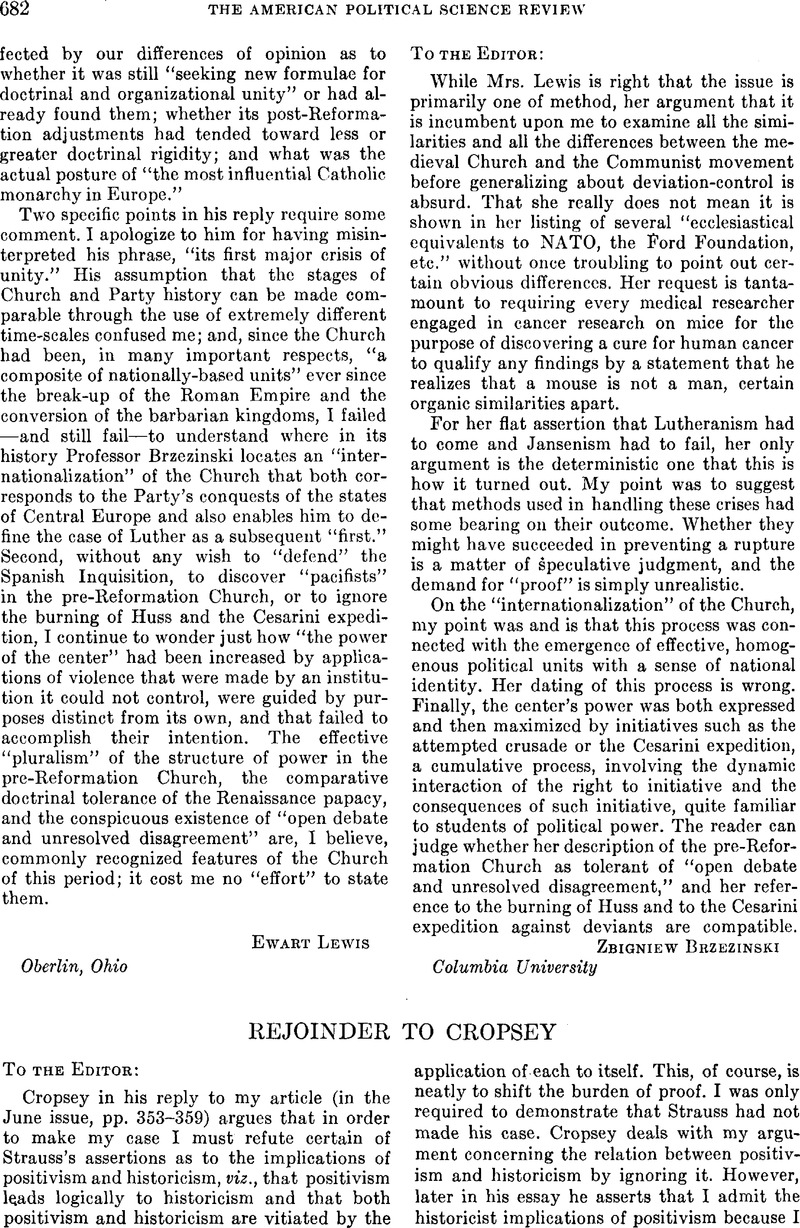Published online by Cambridge University Press: 02 September 2013

1 Because I argue that the direction of a scientist's efforts may be determined by his interests or commitments, Cropsey builds up a fanciful case, whereby I am supposed to mistake Nagel's critique of Weber for his critique of Strauss and at the same time really to take Weber's position. Since any comparison of my position with Nagel's will reveal that the two are almost exactly the same, I can be confused on this point only if Nagel is. And the remarks made are only irrelevant to a rounded discussion of the relationship between science and values if one assumes the correctness of Cropsey's position. Compare p. 344 of my essay with pp. 486–7 of Nagel, N., The Structure of Science (New York, 1961)Google Scholar.
2 It is conceivable that Strauss and Cropsey are merely asserting that social scientists are forced to make judgments of significance. I considered this possibility while writing my original essay but rejected it because, frankly, I regarded such an argument as essentially trivial. No reputable social scientist in the empirical tradition would deny the point, but to use the term “value judgment” so broadly as to include under one rubric both these kinds of judgments and moral judgments proper is to prove one's case by definition and to obscure the issues involved. Particular judgments of significance are compatible with a variety of value systems, as is evidenced by the fact that many people who agree as to the relevant facts still disagree as to which course of action is morally correct in a given situation.
3 Strauss, Leo, Natural Right and History (NRH) (Chicago, 1952), p. 8Google Scholar.
4 It is true that at one place in NRH (not the passage Cropsey cites, but rather a passage on p. 94) Strauss does imply that classic natural right may not be logically related to classical cosmology. However, given the other evidence, all we can assume from this is that Strauss was of two minds on the question. I should say here that in summarizing Strauss's historical discussion I have, in one sense, been unfair. As far as I can determine Strauss's presentation of the views of the classics is in itself a demonstration of the reasonableness of these views, just as the use of the dialogue form in Plato's Republic is, through the example of Socrates, a demonstration of the virtues of philosophy. My failure to summarize the classics (as Strauss views them) in more detail is based on my conviction that no matter how reasonable some of these views seem, the systematic issues are paramount.
Incidentally, Cropsey's remarks as to the relevance of indeterminism (his statement of the principle is incorrect or at least one-sided) to a full discussion of the implications of contemporary physics do not, then, touch on the issues involved.
5 Cropsey asserts that the verification principle rests on the assumption that “to be is to be sensible,” and suggests as an alternative the assumption that “to be is to be intelligible.” If I understand him correctly the following remarks are in order: First, the statement is simply not true. One may accept the possibility of the existence of objects which, by definition, cannot be “sensed,” and still argue that we can only have legitimate knowledge of that which can in some way be related to sense experience. Second, the statement is inaccurate. The principle should be stated as: “to be is to be sensible or capable of being related to things sensed in certain determinate ways.” Scientists believed in the existence of atoms before they had observed them or even were sure they could be observed. Third, the dichotomy is a false one. Contemporary empiricists would agree that “to be is to be intelligible,” i.e., capable of being related to a general body of knowledge and explained in terms of general scientific laws. The real difference between Cropsey and me lies in our views as to what constitutes “intelligibility.” To the contemporary definition, Cropsey would add understanding in terms of some “end” or “essence.” The statement “to be is to be intelligible” in Cropsey's terms requires the existence of such essences or ends.
Comments
No Comments have been published for this article.